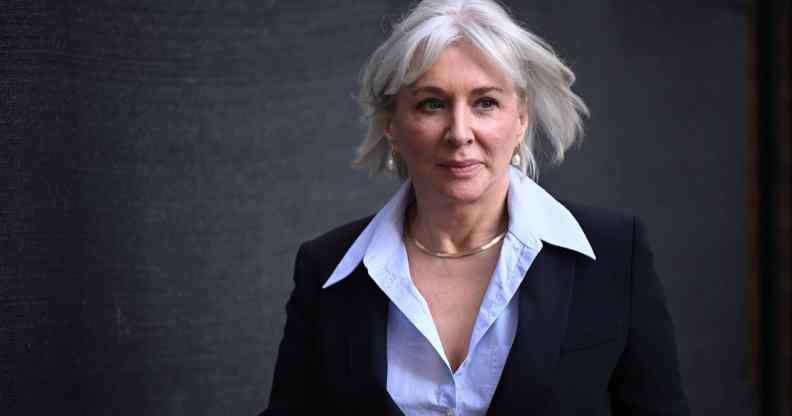Tory minister Nadine Dorries instructs sports chiefs to start excluding trans women

Culture secretary Nadine Dorries has increasingly taken aim at trans rights. (Leon Neal/Getty Images)
Digital, culture, media and sport secretary Nadine Dorries has told British sports bosses they must take swimming’s lead and limit women’s sports to “people born of the female sex”.
Dorries told representatives from football, cricket, rugby, tennis, athletics and other sports Tuesday afternoon (28 June) that trans women competing alongside cis players is “inherently unfair”.
“We can’t pretend that sex doesn’t have a direct impact on a person’s athletic performance,” tweeted Dorries of the roundtable.
“Asking women and teenage girls to compete against someone who was biologically born a male is inherently unfair.
“So today I have made my position absolutely clear: I expect sporting bodies to follow the policy that competitive women’s sport must be reserved for people born of the female sex.”
The minister said “fairness” must be sport governing bodies’ top priority when it comes to deciding how – if at all – trans athletes are eligible to compete nationally.
Just met with sport governing bodies to discuss trans participation. This is a complex and emotionally charged issue – but it’s one that has been ducked for too long. We can’t pretend that sex doesn’t have a direct impact on a person’s athletic performance. (1/5) pic.twitter.com/J69U0wbNvS
— Rt Hon Nadine Dorries (@NadineDorries) June 28, 2022
Her intervention comes as sports chiefs, pundits and politicians are increasingly taking aim at trans athletes.
On 19 June, the International Swimming Federation (FINA) effectively barred trans women from the highest level of competition by only allowing trans women who have “not experienced male puberty” before the age of 12 to take part.
In the name of “competitive fairness”, FINA members voted to banish trans athletes ruled ineligible to a so-called “open category”.
This is the kind of strict policy Dorries wants to see more of in British sports. She told officials – including those from Sport England, which promotes and finances sports in the country – that separate categories “shows compassion to all athletes”.
“Some clear direction is long overdue – not only for athletes but also event organisers and fans,” she added. “There is evidently more to do to make sport fairer for female athletes.”
Dorries has been a consistent critic of trans women taking part in women’s sports. She met with British sports officials after stressing she would always pick “fairness” above “inclusivity” in an opinion piece for The Mail on Sunday.
She immediately praised FINA’s trans swimming ban after saying that it is “impossible” for both trans and cis athletes to compete side-by-side.
But given there is relatively little scientific research involving trans elite athletes, Dorries pressuring British sports is a solution to a problem that doesn’t exist, a legal expert who specialises in gender and genetic discrimination in sport told PinkNews.
“It is important for the UK government to examine the participation of trans athletes and the role of the sports bodies in managing eligibility,” said Seema Patel, a senior lecturer in law at Nottingham Law School.
“But this requires research and evidence, rather than headline comments that have a potentially polarising impact on the debate.”

Prime minister Boris Johnson (L) and culture secretary Nadine Dorries (R) have both bashed trans athletes. (Oli Scarff – WPA Pool/Getty Images)
Following FINA’s new guidelines, the International Rugby League, FIFA and World Athletics, among other international sporting administrators, have either temporarily banned or launched reviews into their trans participation policies.
National bodies such as British Triathlon and British Cycling did the same earlier this year.
But trans athletes and researchers have accused such bodies of acting too hastily. The impact of testosterone on performance is still little understood.
Testosterone, levels of which are often restricted by trans inclusion policies, has long been associated with strength, yet studies have suggested it isn’t even the reason for some performance differences in the first place.
And the science bans on trans athletes rely on can get it wrong. In 2017, a study published in the British Journal of Sports Medicine suggested a causal connection between testosterone levels and enhanced athletic performance among elite female athletes.
The study was authored by employees of track and field’s world governing body, World Athletics, which went on to roll out the following year intense regulations on testosterone levels that banned intersex athletes like Caster Semenya.
Yet in 2021, the very same scientists quietly issued a correction – their study was “exploratory” at best.
“To be explicit, there is no confirmatory evidence for causality in the observed relationships reported,” the correction said.
“With this in mind, we recognise that statements in the paper could have been misleading by implying a causal inference.”
Patel added: “It is incredibly difficult to balance the interests of sport with the rights of both cis female and trans female athletes, but they have been dangerously positioned in opposition of each other which has fuelled a toxic divide.”
“Sports bodies are engaging in what appears to be a much more open and transparent consultation on the inclusion of gender diverse athletes.
“However, there continues to be a narrow focus on the inconclusive science around performance and advantage, with less consideration of the legal implications and human rights at stake.”

